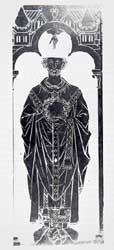Saint Piatus | |
|---|---|
Saint Piatus of Tournai  | |
| Martyr and Evangelist | |
| Born | unknown Benevento, Italy |
| Died | c. 286 Tournai, Belgium[1] |
| Venerated in | Roman Catholic Church, Eastern Orthodox Church |
| Canonized | Pre-Congregation |
| Feast | October 1 |
| Attributes | holding top part of his skull |
| Patronage | Tournai |
Piatus of Tournai (also Piaton, Platon, Piat, Piato) (died c. 286) was a Belgian saint. He was a native of Benevento, Italy, and is traditionally said to have been sent by the pope to evangelize the cities of Chartres and Tournai. Tradition also states that he was ordained by Dionysios the Areopagite. He was martyred under Maximian by having the top of his skull sliced off. He may be recognized in depictions holding the sliced portion of his skull. Saint Eligius later discovered Piatus' relics and made a reliquary for them.[1]
Some of his relics can be found at Chartres Cathedral.[2]
Gallery
References
- ^ a b Jones, Terry. "Saint Piaton". Saints.SQPN.com. Archived from the original on February 21, 2007. Retrieved 2012-03-03.
- ^ Roman, Alexander. "Chartres Cathedral: When East had already met West". Ukrainian Orthodoxy. Archived from the original on October 4, 2006. Retrieved 2007-03-15.
External links
- Saint of the Day, October 1: Piaton at SaintPatrickDC.org
- (in French) Le Retour de Saint Piat - French page that includes pictures of the relics of Saint Piatus
Interwiki
- At the French Wikipedia, a page about "La Grande procession de Tournai", which features a picture of the relics of Saint Piatus
